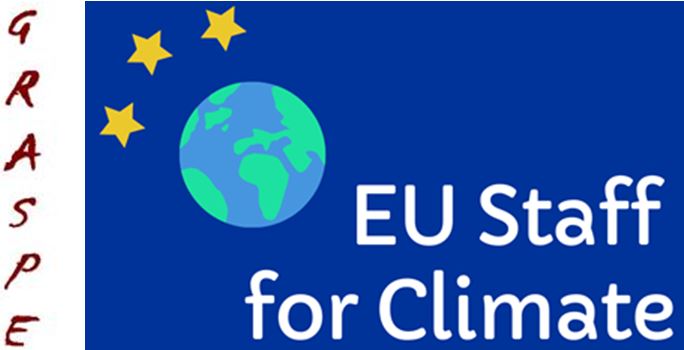
- Cet évènement est passé.
How could post-colonialism and euro-centrism undermine the response to the planetary emergency

The next DG RTD/EU Staff for Climate Knowledge for Sustainability Talk on « How could post-colonialism and euro-centrism undermine the response to the planetary emergency » takes places on Friday 13 October 14-16h CET (Online via Webex).
If you find it interesting please click below link and register through EU Learn
External guests can register directly through the Webex link
https://ecconf.webex.com/ecconf/j.php?MTID=m4fdd7b87198e6bebcb002802c3f2ee5d
The Knowledge for Sustainability talks invite colleagues from EU Institutions, bodies and agencies to take a broader, long-term perspective, beyond the immediate policy-making calendar. They aim to offer disruptive and uncomfortable wisdom to make EU narratives and policies more robust.
In this Knowledge for Sustainability talk organised by DG RTD and EUStaff4Climate, with the help of Active Seniors in the research area, Louis Ninsiima, a climate and human rights activist from the Rise up movement, created by Vanessa Nakate, will set the scene giving an African perspective on the climate crisis and the planetary emergency. Farhana Sultana will provide a systemic perspective on decolonizing climate coloniality. This will be followed by a video contribution by Jason Hickel. Andrew Fanning will share key insights on the economic dimension of colonialism and present compensation models for atmospheric appropriation. This topic is relevant and timely to several ongoing multi-lateral discussions on debt relief, loss and damages, the revision of the global financial framework, or the wider conversation about climate justice.
The South is at the forefront of suffering the consequences of climate change and environmental destruction while only having a very limited historic contribution to its causes and continuing to contribute very little to the unfolding disaster today. The EU often presents itself as a global sustainability leader. Some uncomfortable issues not sufficiently on Northern radar screens may deserve a conversation as they could be undermining the global response to the planetary emergency. 0ur economic practices, our climate policies, and – more widely – our framings and narratives are impacted by multiple colonialities. Do our Euro-centric perspectives prevent us from seeing a bigger picture of the planetary emergency?
Minority and majority world are two new concepts increasingly used. The minority world stands for the smaller and wealthy part of humanity, in what has been called the developed world, the majority world stands for the biggest part of humanity around the globe, previously often called the ‘Third’ World. There are pockets of the minority world in the Global South, and pockets of the majority world in the Global North. Decolonization is important to avoid that perspectives, worldviews, research agendas of the minority world are imposed on the majority world, and to avoid that the green transition of the minority world comes at the expense of and with “neo-colonial plunder” (Hickel) of the majority world.
The enclosed concept note for the course includes useful background reading to prepare for the course.
Draft agenda
Introduction:
- Thomas ARNOLD, Active Senior Green Transition; EUStaff4Climate (confirmed)
Setting the scene:
- Louis NINSIIMA KANDAHURA, Climate and Human Rights activist at Rise Up movement created by Vanessa Nakate, Future Africa Ambassador: An African perspective on the climate crisis and the planetary emergency (confirmed) , (1) Louis Ninsiima. (@LouisKyle_) / X (twitter.com), Louis N. Kandahura | Future Africa
Speakers:
- Farhana SULTANA, Professor at Geography and the Environment Department of Syracuse University NY, Research Director Environmental Conflict and Collaboration: Decolonizing climate coloniality: a systemic perspective (confirmed), The unbearable heaviness of climate coloniality – ScienceDirect, Water Politics: Governance, Justice and the Right to Water – Dr. Farhana Sultana, Critical climate justice (farhanasultana.com)
- Video contribution by Jason HICKEL, Professor at the Institute for Environmental Science and Technology at the Autonomous University of Barcelona; Visiting Senior Fellow at the International Inequalities Institute at the London School of Economics; ERC Synergy Grant Post-Growth Deal: The Economics of Post-colonialism in the planetary emergency (video input) (71) Best of #BeyondGrowth 2023 – Jason Hickel – YouTube, Quantifying national responsibility for climate breakdown: an equality-based attribution approach for carbon dioxide emissions in excess of the planetary boundary – The Lancet Planetary Health, National responsibility for ecological breakdown: a fair-shares assessment of resource use, 1970–2017 – ScienceDirect, Existing climate mitigation scenarios perpetuate colonial inequalities – ScienceDirect, Imperialist appropriation in the world economy: Drain from the global South through unequal exchange, 1990–2015 – ScienceDirect
- Andrew FANNING, Doughnut Economics Action Lab Oxford; Sustainability Research Institute, School of Earth and Environment, University of Leeds, Compensation for atmospheric appropriation (confirmed), Compensation for atmospheric appropriation | Nature Sustainability
Q&A, Participants sharing their feelings, participatory discussion
- Moderation: Obhi CHATTERJEE, DG HR (confirmed), Anna SMEDEBY, EPSO; EUStaff4Climate (confirmed), Alexandre VACHER, REA; EUStaff4Climate (confirmed),
Closure:
- Laurent BONTOUX, Senior Foresight Expert, JRC (confirmed)
Technical lead:
- Jerome SPAANS, DG RTD (confirmed)